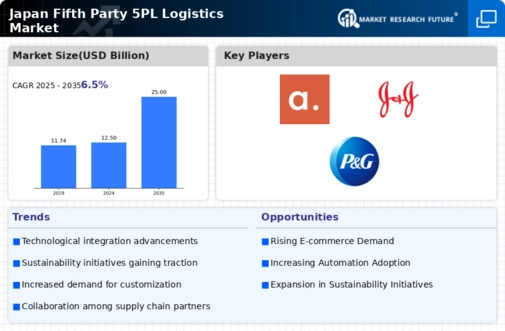The fifth party logistics market in Japan is characterized by a dynamic competitive landscape, driven by the increasing demand for integrated logistics solutions and the growing complexity of supply chains. Major players such as Yusen Logistics (Japan), Nippon Express (Japan), and Kintetsu World Express (Japan) are at the forefront, each adopting distinct strategies to enhance their market positioning. Yusen Logistics (Japan) focuses on digital transformation and innovation, leveraging advanced technologies to optimize logistics processes. Meanwhile, Nippon Express (Japan) emphasizes regional expansion and strategic partnerships to enhance its service offerings. Kintetsu World Express (Japan) is also investing in supply chain optimization, aiming to streamline operations and improve efficiency, which collectively shapes a competitive environment that is increasingly reliant on technological advancements and customer-centric solutions.
The business tactics employed by these companies reflect a concerted effort to localize manufacturing and optimize supply chains. The market structure appears moderately fragmented, with several key players exerting influence over various segments. This fragmentation allows for a diverse range of services, catering to different customer needs while fostering competition among the major players. The collective influence of these companies is significant, as they continuously adapt to market demands and technological advancements, thereby shaping the overall landscape of the fifth party logistics market.
In December 2025, Yusen Logistics (Japan) announced a strategic partnership with a leading technology firm to enhance its digital logistics capabilities. This collaboration aims to integrate AI-driven solutions into their supply chain management, which is expected to improve operational efficiency and customer service. The strategic importance of this partnership lies in its potential to position Yusen Logistics as a leader in digital logistics, enabling them to respond more effectively to the evolving needs of their clients.
In November 2025, Nippon Express (Japan) expanded its operations by acquiring a regional logistics provider, thereby enhancing its footprint in the domestic market. This acquisition is strategically significant as it allows Nippon Express to leverage the existing infrastructure of the acquired company, facilitating quicker service delivery and improved logistics solutions. Such moves indicate a trend towards consolidation in the market, as companies seek to enhance their competitive edge through expanded capabilities.
In October 2025, Kintetsu World Express (Japan) launched a new sustainability initiative aimed at reducing carbon emissions across its logistics operations. This initiative includes investments in electric vehicles and renewable energy sources, reflecting a growing trend towards sustainability in the logistics sector. The strategic importance of this initiative is multifaceted; it not only addresses environmental concerns but also aligns with the increasing consumer demand for sustainable practices, potentially enhancing Kintetsu's brand reputation and customer loyalty.
As of January 2026, the competitive trends in the fifth party logistics market are increasingly defined by digitalization, sustainability, and the integration of AI technologies. Strategic alliances are becoming more prevalent, as companies recognize the need to collaborate to enhance their service offerings and operational efficiencies. Looking ahead, competitive differentiation is likely to evolve from traditional price-based competition to a focus on innovation, technology integration, and supply chain reliability. This shift underscores the importance of adaptability and forward-thinking strategies in maintaining a competitive edge in the rapidly changing logistics landscape.













